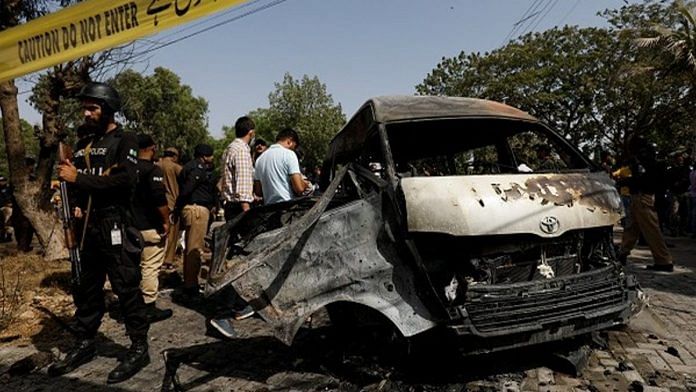New Delhi: The killing of four civilians — three of whom were Chinese nationals and the alleged intended targets — in a suicide bombing at Pakistan’s Karachi University Tuesday has brought renewed focus on the issue of the Balochistan insurgency and separatism.
Not only did the militant group Balochistan Liberation Army (BLA) claim responsibility for the bombing, it also reportedly shared a photo of the woman who carried out the attack.
According to The Express Tribune, the woman was identified as Shari Baloch, alias Baramsh, a primary school teacher in Balochistan’s Kech district who had a Master’s in zoology.
Baloch’s last purported tweet, posted the afternoon of the bombing, her identity as a woman suicide bomber, and her targeting of Chinese civilians in Pakistan have received a great deal of attention, and prompted speculative questions about her motivations and the possible evolved tactics of Baloch insurgents.
‘Restructuring’ of Baloch insurgency
As suggested by Tilak Devasher’s book, The Balochistan Conundrum, the roots of Baloch separatism can be traced to the 19th century, in the aftermath of British defeat in the Afghan wars and “The Great Game”.
At the time, the British Raj controlled vast regions of what are now Pakistan and Afghanistan, and let go of parts of Balochistan (then the princely state of Kalat) to Iran, in order to “further stall the potential Russian advance towards India”.
The Raj set up a Balochistan Agency, which came about as the result of a treaty signed at the Baloch town of Mastung by local rulers like the Khan of Kalat and Baloch Sardars, who “accepted” the Raj “as sole arbitrator in disputes”. This represented a move away from the previous Raj policy of minimal interference in matters concerning the NWFP [North-West Frontier Province] region and its inner provinces.
This agency remained in place as a purported pacifier against regional violence until the violent period of the Partition. But its policy of administrative divisions and demarcations of Baloch tribes, and the subsequent impact on Baloch nationalism prior to Partition, is a subject of debate among historians.
As such, the first of five major periods of Baloch nationalist insurgency began within a year of Pakistan’s independence, as Kalat acceded to Pakistan under controversial circumstances, after Pakistan initially agreed to recognise it as a sovereign princely state.
Led by the then-princes of Kalat, the first insurgency was defeated by Pakistan in 1950, but three more insurgencies emerged in the subsequent decades, with each of the latter ones more protracted and better supported by a growing number of separatists than its predecessor.
Moreover, the fourth insurgency, from 1973 to 1977, involved “55,000 insurgents [facing] 80,000 Pakistani troops supported not only by Pakistani Air Force but also the Iranian Air Force. More than 5,000 insurgents and over 3,300 soldiers were killed”, Alok Bansal writes in The Revival of Insurgency in Balochistan.
But these were all overshadowed by the fifth phase, which began in 2004 and is considered to still be ongoing.
Security analyst Muhammad Amir Rana believes that this year has seen a “restructuring” of the Baloch insurgency, in light of a spike in Baloch terrorist attacks since January.
“The new ranks of Baloch insurgents are educated and politically radical, and are transforming the insurgency into guerrilla warfare,” he wrote in Dawn last month.
“Contrary to their previous leadership, which was not averse to reconciling with the government whenever it sought to secure tribal and family interests, the new leadership has few compulsions on this score, as most of them come from humble backgrounds. This makes the counter-insurgency challenge a complex one,” he added.
Given the political turmoil that Pakistan has faced at the executive level due to the departure of Imran Khan and the collapse of his cabinet, this “counter-insurgency challenge” remains at the backdrop and is likely all the more heightened.
But Rana warns that any attempts from the new (Shehbaz Sharif) government to counter the Baloch insurgency by way of “religion and religiously motivated groups” would prove to be “counterproductive”.
(Edited by Nida Fatima Siddiqui)
Also read: Jihadi financier, who never gave interview or speech, now uses social media to recruit in India



